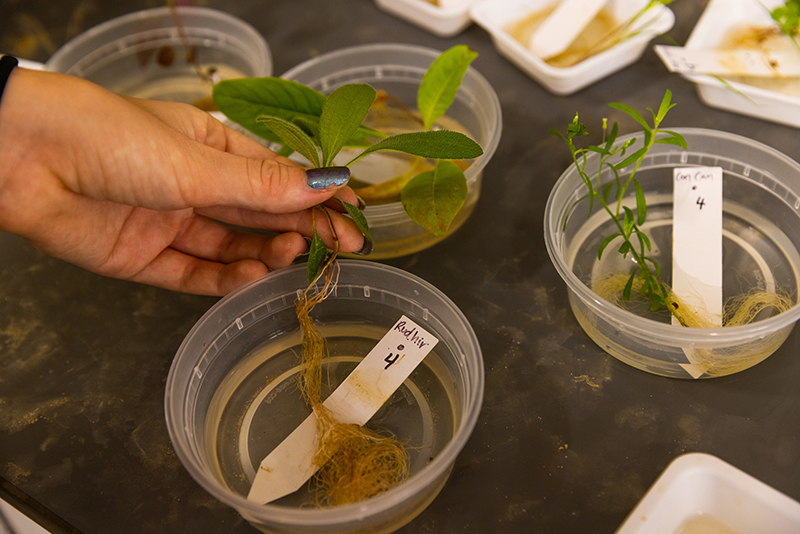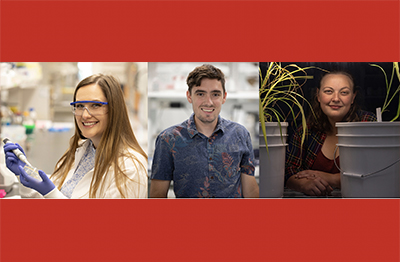
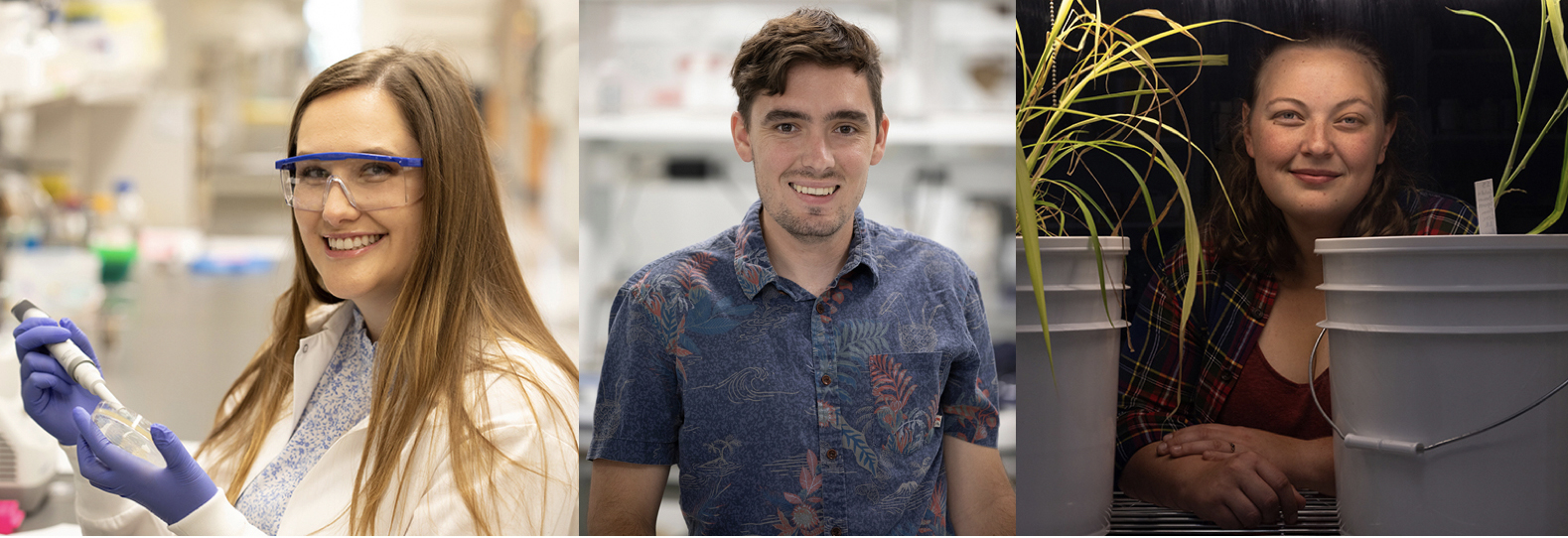
Two Miami doctoral students, two 2021 alumni receive NSF Graduate Research Fellowships
Four 2019 graduates also received the Fellowship
 By Susan Meikle, university communications and marketing
By Susan Meikle, university communications and marketing
Miami University doctoral students Keaka Farleigh and Katherine Stahlhut, and 2021 graduates Lexie Adams and William Carson, have been awarded fellowships from the National Science Foundation’s (NSF) Graduate Research Fellowship Program.
They are among approximately 2,074 Graduate Research Fellowship (GRF) recipients selected from more than 13,000 applicants.
The prestigious award recognizes outstanding graduate students in NSF-supported science, technology, engineering and mathematics disciplines who are pursuing research-based master’s and doctoral degrees. Undergraduate students preparing to enter a graduate program, and graduate students who have not completed more than one academic year of a graduate, may apply to the GRF program.
The fellowship provides three years of financial support including an annual stipend of $34,000, coverage of tuition and fees, and opportunities for international research and professional development.
Alexandra "Lexie" Adams (Miami '21)
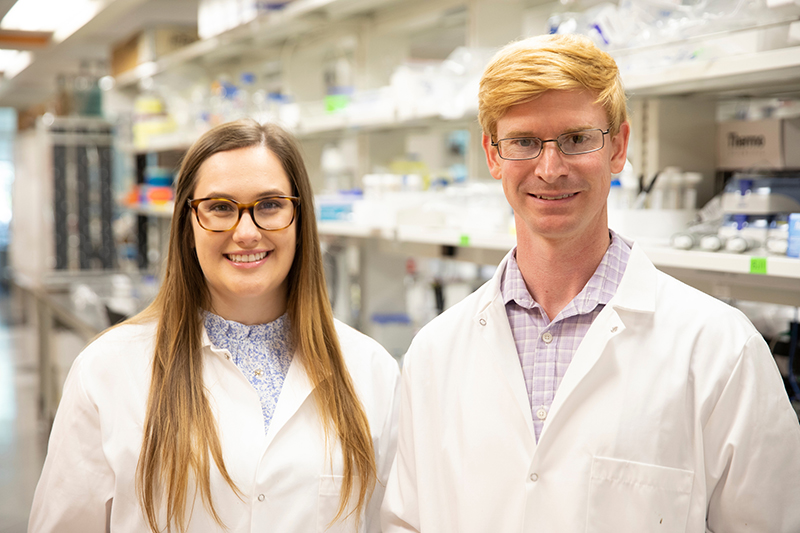
Lexie Adams with faculty mentor Andrew Jones (image by Jeff Sabo).
Adams graduated from Miami in May with bachelor's degree in chemical engineering and a Spanish minor. This fall, she will join Stanford University’s doctoral program in bioengineering.
In the meantime, this summer she has been a research assistant for her faculty mentor Andrew Jones, assistant professor of chemical, paper and biochemical engineering. Adams has worked with Jones since the fall of 2017 — the first semester at Miami for both of them — on a project involving the production of psilocybin in the Escherichia coli bacteria. Psilocybin, the psychoactive component of ‘magic mushrooms,’ is currently being tested in treatments of depression, anxiety and PTSD. Jones and his lab were the first to report a new approach to the production of psilocybin by E. coli.
This past year Adams mentored other undergraduates in Jones’ lab group. Before graduating this spring, she transitioned her part of the research project to her mentee Jessica Flowers, a junior bioengineering major.
Adams and other talented undergraduates have played a large role in the success of Jones’ research, he said. His discovery of the production of psilocybin by E.coli has led to a $1 million research grant to extend these studies; two current patents; and the creation of a start-up company — PsyBio Therapeutics Corp — to commercialize his work. Jones serves as the chairman of the scientific advisory board of the company.
Adams’ success is due in large part to her research experience with Jones. She is the recipient of several prestigious undergraduate awards including:
- 2021 President’s Distinguished Service Award.
- 2020-2021 Astronaut Scholarship.
- 2020-2021 Goldwater Scholarship.
- 2020 Provost’s Student Academic Achievement Award.
- 2019 Student Organization Leader Award from the office of student activities for her work with the Miami chapter of Engineers Without Borders (EWB).
Will Carson (Miami ’21)
Carson graduated in May with a major in chemistry and neuroscience co-major. He is a new doctoral student in chemistry at Princeton University. He was a member of Miami's university honors program, and a recipient of the 2020 Provost’s Student Academic Achievement Award. He conducted undergraduate research with faculty mentors Scott Hartley, professor of chemistry and biochemistry, and Wei Liu, former assistant professor.
Keaka Farleigh
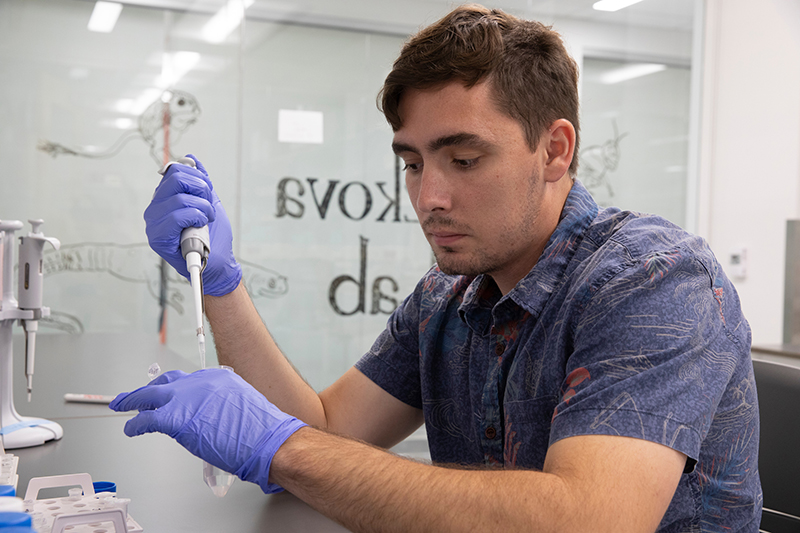
Keaka Farleigh, with Jezkova Lab window art in the background (image by Jeff Sabo).
Farleigh is a third-year doctoral student in Ecology, Evolution and Environmental Biology working with research adviser Tereza Jezkova, assistant professor of biology. He was awarded the NSF GRF in 2020* (due to campus and lab closures during the COVID-19 pandemic stay at home orders in Ohio, we are highlighting his award this year).
His research focuses on identifying genetic signals of adaptation to different environments in the chisel-toothed kangaroo rat and other species. Many species occupy vast geographic ranges that span different environmental conditions, Farleigh said, particularly the chisel-toothed kangaroo rat, which can be found in the arid Mojave Desert to the Great Basin Desert area of Nevada, Oregon and Utah.
Working with a set of tissue samples from 250 individuals across the species’ entire geographic range , Farleigh is conducting DNA sequencing and computational analysis to identify links between genetic signatures and local adaptation to the different environments.
For example, the rats’ chisel-like teeth are adapted to removing the salty outer parts of Saltbush leaves, a desert plant. But that morphological adaptation is not needed for rats in the northern or mountainous part of the range that eat grains, seeds and nuts. Understanding different strategies that allow species to occupy diverse environmental conditions, such as genomic adaptation, is critical to predict responses to current and future environmental changes, according to Farleigh.
He has conducted similar research with Jezkova on rattlesnakes and desert horned lizards (published July 2021).
Farleigh uses the RedHawk Cluster High Performance Computing for analysis of his large data sets. He helped teach Miami’s first Computer Science in Modern Biology workshop. The free, week-long student advancement workshop is offered for graduate, undergraduate and high school students to gain computer skills while working with biological data sets generated by labs at Miami. The workshop is supported by funding from M.I.A.M.I. WOMEN Giving Circle and the NSF.
Farleigh’s research has also been supported by a grant from the American Museum of Natural History Theodore Roosevelt Memorial Fund.
Katherine (Katie) Stahlhut
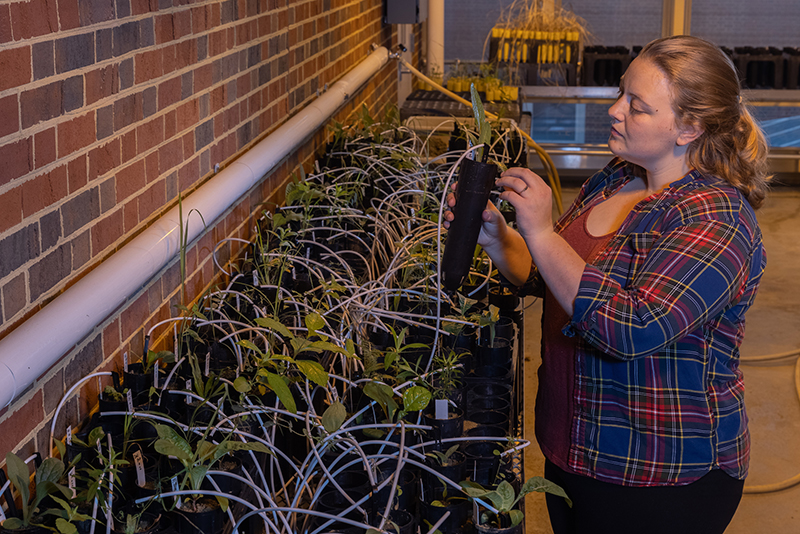
Katie Stahlhut tends plants in the Pistell Greenhouse (image by Scott Kissell).
Stahlhut is a second-year doctoral student in botany working with research adviser Jonathan Bauer, assistant professor of biology.
Her research focuses on the interactions between mycorrhizal fungi and plants. In this mycorrhizal symbiosis plants provide the fungi with sugars, and the fungi provide plants with nutrients they take up from the surrounding soil.
Her GRF project involves researching mycorrhizal symbiosis and variation in switchgrass, a grass native to the North American tallgrass prairie.
Using tools such as genetic sequencing and Miami’s newly renovated Pistell greenhouse in Pearson Hall, Stahlhut aims to identify if mycorrhizal community structure is related to the growth and survival of different populations of switchgrass.
She will collect seeds from samples of switchgrass grown in about 12 different areas across the eastern United States and then assess how responsive each genotype is to mycorrhizal fungi in a greenhouse setting. She expects to find that the proportion of each mycorrhizal fungal species a plant associates with will be related to environmental variables of the sites from which the plant seeds were sourced.
Stahlhut has also been mentoring the summer research of two undergraduates in the Bauer lab group, assessing how mycorrhizal symbiosis shifts different plant traits such as nutrient uptake, root length and water use efficiency in 27 important prairie species. Lydia Witt,a senior biology major, was a 2021 Miami University Undergraduate Summer Scholar, and Josie Laing, a senior botany major and food systems and food studies co-major, was a member of Miami’s 2021 NSF-funded Research Experience for Undergraduates - Ecology in Human-Dominated Landscapes (Eco REU) program.
Measuring roots of seedlings
Miami 2019 alumni who received the 2021 NSF Graduate Research Fellowship
- Nicholas J. Fendinger (Miami’19), graduate student in psychology at the University of North Carolina, Chapel Hill.
- Krystina Hird (Miami ’19), graduate student in the biochemistry and molecular program at Michigan State University. Hird was a 2018-2019 Beckman Scholar.
- Robert Krueger (Miami ’19), graduate student in mathematics at the University of Illinois at Urbana Champaign. Krueger was a 2018-2019 Goldwater Scholar.
- Leah Kuhn (Miami ’19), graduate student in chemistry at Florida State University.
Current Miami doctoral students Akanksha Das and Shelby Ortiz, both clinical psychology, and Jared Tangeman (Miami’17), biology, received the NSF Graduate Research Fellowship in 2019. Read more about them online at Three doctoral students awarded NSF Graduate Research Fellowships (May 13, 2019).

